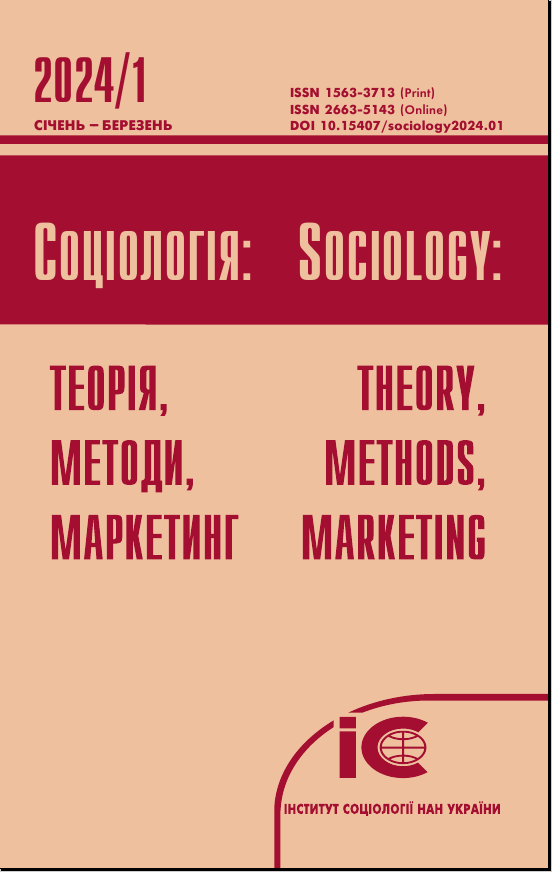Field research: arrangement, conducting, and analytics
stmm. 2023 (3): 116-129
DOI https://doi.org/10.15407/sociology2023.03.116
Full text: http://stmm.in.ua/archive/ukr/2023-3/9.pdf
TETIANA KAMENSKA, Doctor of Sciences in Sociology, Professor at the Department of Social Communication and Regional Studies, Odesa I.I. Mechnikov National University (Dvorianska, 2, Odesa, 65000)
nikadevichya@gmail.com
http://orcid.org/0000-0001-7410-058X
The article clarifies how sociological research methodology is adjusting to the current changes taking place in Ukrainian society. The goal is to specify some aspects of phenomena research, and to concentrate on field research from historiography, theoretical background, and to certain procedures of gathering information and its analysis. Based on the works of famous German qualitative methodology experts we also referred to M. Heidegger’s works to be more specific about “phenomenon” definition. We have proved that phenomena are some things and processes not fully appeared which we can discover, and which in scientific discourse must be distinguished from appearance. The word “appearance” tells for itself — it is that which has already appeared. Some definitions on field research taken from the works of German sociologists allowed reconfirmation of this methodology to be used in researches of the current Ukrainian social reality. Such components of field research as “observation” and “conversation” were given the following new characteristics: systematized role behavior of a researcher-observer, and authorial vision of structuring data and observation results. The analytical processing of sociological data was held in the frame of grounded theory (by Anselm Strauss and Judith Corbin), and the method of qualitative content-analysis of conversations was tested and endorsed through the example of research among rural population. Drawing on the results of three types of coding (open, axial, and selective) we have built up a mini-theory of the phenomenon of how population in small towns and villages in Odessa region take representatives of local authorities in everyday life. In comparison with operational definition the analysis result based on the strategy of mini-theory consists of five parts where we start out from the “history line”, then we find out how the past influences the contemporary state of a researched phenomenon, describe context, subjects’ actions and counteractions, and determine the consequences.
Keywords: field research, phenomenology, phenomenon, field observation, role behavior of an observer, conversation, mini-theory
References
Handbuch. (1995). Qualitative Sozialforschung (Grundlagen, Konzepte, Methoden und Anwendungen). Weinheim: Psychologie Verlags Union.
Heidegger, M. (1977). Sein und Zeit. Frankfurt am Main: Limburger Vereinsdruckerei Gmb.
Strauss, A., Corbin, J. (1990). Basics of qualitative research: Grounded theory procedures and techniques. Newbury Park, CA: Sage.
Received 16.07.2023
Field research: arrangement, conducting, and analytics
stmm. 2023 (3): 116-129
DOI https://doi.org/10.15407/sociology2023.03.116
Full text: http://stmm.in.ua/archive/ukr/2023-3/9.pdf
TETIANA KAMENSKA, Doctor of Sciences in Sociology, Professor at the Department of Social Communication and Regional Studies, Odesa I.I. Mechnikov National University (Dvorianska, 2, Odesa, 65000)
nikadevichya@gmail.com
http://orcid.org/0000-0001-7410-058X
The article clarifies how sociological research methodology is adjusting to the current changes taking place in Ukrainian society. The goal is to specify some aspects of phenomena research, and to concentrate on field research from historiography, theoretical background, and to certain procedures of gathering information and its analysis. Based on the works of famous German qualitative methodology experts we also referred to M. Heidegger’s works to be more specific about “phenomenon” definition. We have proved that phenomena are some things and processes not fully appeared which we can discover, and which in scientific discourse must be distinguished from appearance. The word “appearance” tells for itself — it is that which has already appeared. Some definitions on field research taken from the works of German sociologists allowed reconfirmation of this methodology to be used in researches of the current Ukrainian social reality. Such components of field research as “observation” and “conversation” were given the following new characteristics: systematized role behavior of a researcher-observer, and authorial vision of structuring data and observation results. The analytical processing of sociological data was held in the frame of grounded theory (by Anselm Strauss and Judith Corbin), and the method of qualitative content-analysis of conversations was tested and endorsed through the example of research among rural population. Drawing on the results of three types of coding (open, axial, and selective) we have built up a mini-theory of the phenomenon of how population in small towns and villages in Odessa region take representatives of local authorities in everyday life. In comparison with operational definition the analysis result based on the strategy of mini-theory consists of five parts where we start out from the “history line”, then we find out how the past influences the contemporary state of a researched phenomenon, describe context, subjects’ actions and counteractions, and determine the consequences.
Keywords: field research, phenomenology, phenomenon, field observation, role behavior of an observer, conversation, mini-theory
References
Handbuch. (1995). Qualitative Sozialforschung (Grundlagen, Konzepte, Methoden und Anwendungen). Weinheim: Psychologie Verlags Union.
Heidegger, M. (1977). Sein und Zeit. Frankfurt am Main: Limburger Vereinsdruckerei Gmb.
Strauss, A., Corbin, J. (1990). Basics of qualitative research: Grounded theory procedures and techniques. Newbury Park, CA: Sage.
Received 16.07.2023
